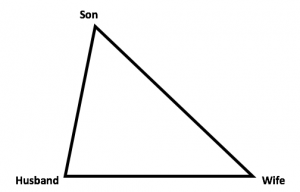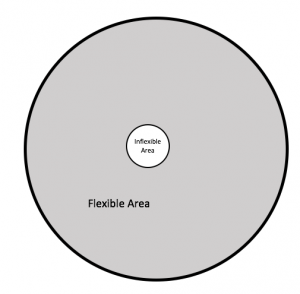On the Marriage Podcast for Smart People we don’t often talk about parenting. But when it’s impacting your marriage, then it’s our business!
Fighting over kids, or parenting issues is a very common source of marital conflict. It’s common, but it’s also really frustrating and it can be a tough rut to get out of.
A further negative of this fighting situation though, is that disagreements on childrearing can actually have negative effects on your children’s wellbeing. It’s not just a source of conflict between you and your spouse, but it can also put a burden on your children too.
To help you, as parents, align, and to make things easier on your kids, we have a few ideas for you to try that we know will help.
Show a United Front When Parenting
Research has shown that children react to incongruent parenting styles with various emotional and behavioural problems including anxiety, depression, aggression, and rule-breaking.[i]
Results of that study showed that when children perceive a lot of difference between maternal and paternal parenting, it has a negative effect on the child’s emotional and behavioural well-being.
These results display the importance of parents working together in the face of child-rearing disagreements to display a united and congruent front to their children. Kids are way smarter that we all think they are. They’re using their brains way sooner than we think they are, too. Developmentally, babies and toddlers are picking up on parenting differences before they can talk and possibly even before they can walk. A united front is essential with children of all ages.
You’re probably thinking, how can we show a united front when that is precisely the problem: we aren’t united!? Here are some ideas.
Flexible/Inflexible Areas Help Clarify Parenting Priorities
Caleb has used this intervention with many couples (including premarital couples only just thinking about raising kids) and it is a huge help.
It’s an exercise from Dr. Gottman, and we call it flexible/inflexible areas.
Take a blank sheet of paper, and on it draw a circle as large as you can. Inside that, you’ll draw another circle, about the size of the largest coin in your currency.
In the small circle write two words: inflexible area.
In the large circle, write two words: flexible area.
When you are disagreeing with your spouse, ultimately all of the content of your disagreement falls into one of these circles. The flexible area has all the little reasons you give but, at the end of the day, you would be willing to compromise on. The inflexible area is the core, essential thing you are trying to protect. This is something that you cannot and will not budge on.
Before we figure out how to sort things out, let’s look at why most people never get to the bottom of their parenting arguments:
- They only talk about the details of the flexible area
- They try to make the flexible area – things they would otherwise compromise on – as large as possible so that they can protect the inflexible area
- They don’t talk about the inflexible area – the one area that they most need to discuss openly.
- Or, they stuff as much of the flexible items into the inflexible area and make it seem so big that they are totally stuck, even on little things – and often come across as unreasonable during a disagreement.
If you want to start working together instead of against each other, you have to bring the absolute core of that inflexible area out into the light and share it with your spouse. That’s you saying something like, “I’m willing to be flexible on all sorts of things, but this is the one thing that I cannot see myself compromising on.” And then tell your spouse why – it’s probably something from your childhood that informs this inflexible area.
Here’s the key! You don’t have to have alignment or agreement on the inflexible areas, you both just have to agree to honour each other’s inflexible areas.
Now, instead of fighting about the kids you’ve said what is super important to you and you’re working together on honouring that part for each other. That’s critical: you have to honour this inflexible area your spouse has. It should be a value or a dream or a goal – something virtuous. You can figure out how to honour that in each other and still be good parents because you have sound values in those inflexible areas.
The Bible verse in Amos says, “How can two walk together unless they are in agreement?” This is the agreement: not to hold the same thing, but to agree to honour each of your respective values.
De-triangulation Keeps Parenting Aligned
Another key area that Caleb works with couples on is called detriangulation.
Again, visualize (or draw!) a shape – but a triangle this time. A triangle has three points: one for you, your spouse, and your child. If you have three children, you have three possibilities for that third point in the triangle.
The line between each point is called the leg of a triangle. And for each leg, the length is how close you are, relationally to that person. If you’re close, it’s a short leg; if you’re not close, you repel and it’s a long leg.
Let me give you a scenario. This represents what happens in families all the time, even if this particular scene hasn’t happened in your family yet.
Teenage Son has fi
Perhaps Dad is at work a lot. He feels guilty about that, so enjoys this closeness with his son and doesn’t entirely see what is happening. He sides with the child against Mom because it relieves his daddy-guilt about not being there for his kids.
The teenager gets what he wants and nobody can figure out why mom is so upset – they just know she’s a bit over the edge in this situation which actually reinforces the triangle!
Mom feels threatened about the marriage because she is competing with someone for her husband, so she attacks him, which keeps him away and makes that leg of the triangle longer.
If Dad is going to side with Mom, he’ll have to experience the anger and possibly the rejection of the teenager.
It’s not an easy cycle to break out of! Triangles are wicked business but they happen all the time. For more on triangles check out Episode 26: How Trigonometry Impacts Your Marriage and also Episode 2: When Did You Divorce Your Husband Marry the Kids?
Your children might be angry with you when you de-triangulate, and they might say some nasty things, but the research is very consistent that kids do best when Mom and Dad are taking care of their marriage. So, here’s what you need to do.
No matter what is happening, and no matter how many triangles you have going on – the shortest leg always needs to be the one between husband and wife. You have to side with your spouse.
Even if your spouse is mishandling a situation, side with her. Obviously that doesn’t apply if there’s abuse happening or someone’s safety is at risk, but in the normal day-to-day in-the-trenches work of parenting, support your spouse – all the time. You need to know that you have each other’s back and that the kids can’t play you off each other.
You’re a team. Agree to do that for each other – have their back.
Part of this is affirming the pre-eminence of your spouse. Your kids need to see you choosing each other over choosing to side with one of them against your spouse. This sets a boundary on your kids and means so much to your husband/wife.
If your spouse lost it and screwed up a parenting moment, the part that goes hand in hand with this is that yes, you backed your spouse up even though you didn’t like what was going down – but then the offending parents has to be willing to receive feedback and then go back to the child and apologize when necessary. You still back each other up!
Think About Where and How You’re Having Your Arguments
Another thing to think about when fighting about raising kids is realizing where you’re fighting.
There is a common misconception that letting your kids see you fight is a good idea. If your kids do happen to see you fight, the only thing that is a very good idea is for them to see you reconcile. While you may disagree, the continuous observation of parental conflict is not healthy.
In fact, Grych et al (2000) researched this. They looked at two samples of children; “one drawn from the community (317 ten to fourteen-year-olds) and the other from battered women’s shelters (145 ten to twelve-year-olds).”[ii]
They wanted to learn how kids were impacted by seeing their parents fight and have conflict over them. They found that children who believe that they are responsible for causing parental discord, especially when that discord leads to verbal or physical aggression, may experience guilt, sadness, and diminished self-worth.
Children who feel responsible for the parental conflict and are unable to stop it from occurring might develop a sense of helplessness that elicits other symptoms of internalizing problems.
The researchers also observed that when kids know the fight is about them, they try to get in there and help solve it. This leads to them carrying far more responsibility than what they are developmentally capable of. It leads to a lot of self-blame as those kids take responsibility for their parents’ conflict.
That is not a good thing.
The solution here is much the same as for detriangulation:
- First step: back each other up in the moment
- Second step: disagree later, in private and do it in a way that doesn’t make your spouse or your children feel threatened about the security of the marriage bond. If you need some help with healthy fighting, we have a whole series of episodes. You can start at the first one: Why Fighting Is Good For Your Marriage.
Which leads to our last point:
Work on Your Marriage
Are you always fighting about the kids? Here’s the deal: the kids most likely aren’t the problem – your marriage is!
If you can take care of your marriage then either the kids will self-regulate or, if they don’t, you’ll be a more successful parenting team because you’ve taken care of the core relationship in the family structure: the marriage relationship.
The more effectively you’re able to relate to your spouse, the more capable you’ll be as a parent.
This was proven by a study in 2011 which looked at a more extreme situation than most of us face: high-risk fathers, either high-school dropouts or diagnosed with mental illness. As they taught these fathers relational competence (the ability to relate effectively) to their wives or even ex-wives, they became more capable fathers.[iii]
If the real issue is your marriage, then really focus on that for a period of time. Give yourself 6 months where you limp through the parenting, but really take care of your marriage.
What Caleb sees happening when he is counselling couples with kids is that once their marriage is stabilized they go back to some of the long-term, outstanding things they’ve never solved and they figure out how to work their way through them. This doesn’t happen though until the marriage calms down and they’re connecting again and learning to relate to each other. At this point, they can work through parenting issues.
Basically, it all comes back to communication. The better you are at communicating with each other, the less conflict you’ll have in parenting or even co-parenting relationships.[iv] At the end of the day, these are issues you need to talk through, so once again it comes back to communication.
In fact, when communication is poor, there is more triangulation going on, alliances are formed with children, and stress increases as a result.
In summary, fighting about raising the kids is painful, and usually leads nowhere. Learn to identify what you are willing to be flexible on, and what is sacred to you which you will not be flexible on. Realize when your kids are triangulating you away from your spouse, and reverse the process. Always take the side of your spouse.
And remember, if you’re fighting about the kids, your marriage is probably the problem – not the kids!
[i] Myra Berkien et al., “Children’s Perceptions of Dissimilarity in Parenting Styles Are Associated with Internalizing and Externalizing Behavior,” European Child & Adolescent Psychiatry 21, no. 2 (February 2012): 79–85, doi:10.1007/s00787-011-0234-9.
[ii] J. H. Grych et al., “Interparental Conflict and Child Adjustment: Testing the Mediational Role of Appraisals in the Cognitive-Contextual Framework,” Child Development 71, no. 6 (December 2000): 1648–61.
[iii] Le Ngu and Paul Florsheim, “The Development of Relational Competence Among Young High-Risk Fathers Across the Transition to Parenthood,” Family Process 50, no. 2 (June 2011): 184–202.
[iv] Amy M. Kolak and Brenda L. Volling, “Parental Expressiveness as a Moderator of Coparenting and Marital Relationship Quality*,” Family Relations 56, no. 5 (December 2007): 467–78.
Podcast: Play in new window | Download (Duration: 30:18 — 42.0MB)



